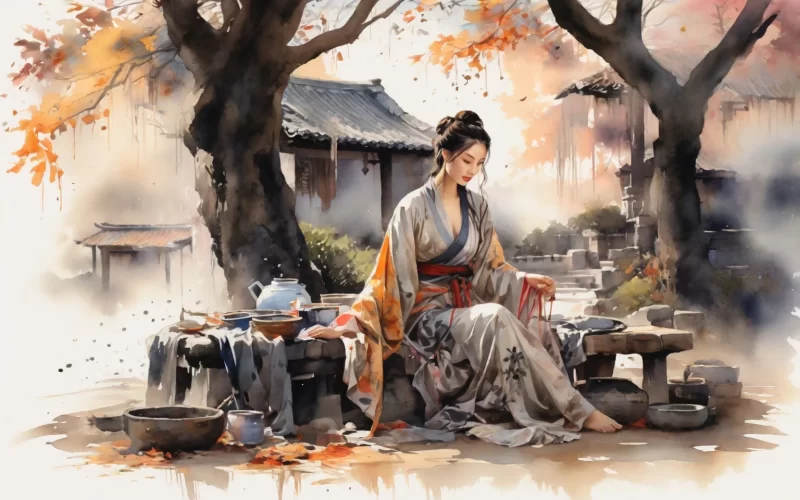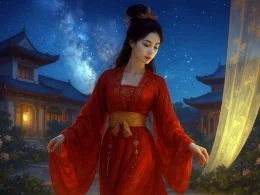Living under a thatch roof, never wearing fragrant silk, She longs to arrange a marriage, but how could she dare ? Who would know her simple face the loveliest of them all When we choose for worldliness, not for worth ? Her fingers embroider beyond compare, But she cannot vie with painted brows; And year after year she has sewn gold thread On bridal robes for other girls.
Original Poem
「寻西山隐者不遇」
丘为
绝顶一茅茨,直上三十里。
扣关无僮仆,窥室唯案几。
若非巾柴车,应是钓秋水。
差池不相见,黾勉空仰止。
草色新雨中,松声晚窗里。
及兹契幽绝,自足荡心耳。
虽无宾主意,颇得清净理。
兴尽方下山,何必待之子。
Interpretation
As a leading figure of the Wang Wei-Liu Changqing pastoral tradition, Qiu Wei excelled in depicting scholarly reclusion and spiritual communion with nature. This masterpiece transforms a "failed visit" into a profound encounter with the essence of hermitic ideals, revealing deeper truths through absence rather than presence.
First Couplet: "绝顶一茅茨,直上三十里。"
Jué dǐng yī máo cí, zhí shàng sānshí lǐ.
A lone thatched hut crowns the peak's height, Thirty steep miles climbed in one flight.
The opening vertical journey ("thirty steep miles") mirrors the spiritual ascent toward reclusion. The "thatched hut" (茅茨) symbolizes radical simplicity against mountain grandeur.
Second Couplet: "扣关无僮仆,窥室唯案几。"
Kòu guān wú tóng pú, kuī shì wéi àn jǐ.
No servant answers my knock's sound, Inside—just a desk, austere and round.
The empty interior speaks volumes: the recluse's absence becomes a presence through his minimalist furnishings. The circular "round desk" (案几) hints at Zen completeness.
Third Couplet: "若非巾柴车,应是钓秋水。"
Ruò fēi jīn chái chē, yīng shì diào qiū shuǐ.
Either gathering firewood his cart bears, Or fishing in autumn's liquid prayers.
The poet imagines the recluse engaged in Daoist "useless usefulness"—activities that seem mundane but are spiritually charged. The "liquid prayers" metaphor sanctifies ordinary fishing.
Fourth Couplet: "差池不相见,黾勉空仰止。"
Chāchí bù xiāng jiàn, mǐnmiǎn kōng yǎngzhǐ.
Our paths crossed not in time's wide sea, My reverent efforts—fruitless, free.
The admission of "fruitless" (空) seeking gradually transforms into liberation ("free"), foreshadowing the poem's enlightenment.
Fifth Couplet: "草色新雨中,松声晚窗里。"
Cǎo sè xīn yǔ zhōng, sōng shēng wǎn chuāng lǐ.
Rain-freshened grasses gleam intense, Through evening window—pines' resonance.
Nature becomes the true host: visual ("gleam") and auditory ("resonance") purity replace human interaction. The window frame turns into a spiritual viewfinder.
Sixth Couplet: "及兹契幽绝,自足荡心耳。"
Jí zī qì yōu jué, zì zú dàng xīn ěr.
This solitude, so stark, so bright, Cleanses mind and ear with light.
The paradoxical "stark brightness" captures enlightenment's essence. The cleansing of senses suggests rebirth through nature's austerity.
Seventh Couplet: "虽无宾主意,颇得清净理。"
Suī wú bīn zhǔ yì, pō dé qīngjìng lǐ.
No host-guest ritual shared today, Yet I've grasped serenity's way.
The "serenity's way" (清净理) refers to Buddhist-Daoist enlightenment. The absence of formal interaction underscores true spiritual meeting.
Eighth Couplet: "兴尽方下山,何必待之子。"
Xìng jìn fāng xià shān, hébì dài zhī zǐ.
My soul fulfilled, I descend anew— Why insist on meeting someone who's true?
The closing allusion to Wang Huizhi's famous "satisfied impulse" visit demonstrates perfect non-attachment. The rhetorical question affirms that true reclusion is ultimately internal.
Holistic Appreciation
Though titled "After Missing the Recluse on the Western Mountain" this poem transcends conventional disappointment, instead discovering profound meaning in the very act of not meeting. Qiu Wei progressively reveals both his genuine admiration for the recluse and the pristine beauty of mountain solitude. The journey traces an emotional arc—from initial anticipation, through fleeting regret, to ultimate transcendence within nature's embrace. What begins as "absence" transforms into spiritual "presence," with the failed encounter becoming its own revelation. This ingenious structure reflects the poet's exceptional conceptual depth and philosophical vision.
Artistic Merits
The poem's architecture moves deliberately from physical search ("form") to philosophical realization ("essence"). Deceptively simple language carries rich visual and meditative power, using scenery to convey emotion and landscape to express ideals. Each unadorned phrase resonates with life wisdom and aesthetic refinement, ranking among the finest Tang dynasty reclusive landscape poetry.
Insights
By failing to meet the recluse yet comprehending "the principle of purity" amid pines and clouds, the poet embodies life's most precious epiphanies. When reality diverges from expectation, can we, like the poet, discover in "missing" and "vain seeking" a path to self-awareness and liberation? This work teaches that some quests reach fulfillment not in their destinations but in their undertaking—that certain "non-encounters" constitute life's truest meetings.
Poem translator
Kiang Kanghu
Qiu Wei (丘为, c. 694–789), a Tang dynasty poet from Jiaxing, Suzhou (modern Zhejiang Province), initially lived in mountain seclusion before obtaining the prestigious jinshi degree in 743. He rose to the position of Crown Prince's Right Advisor. His poetry, predominantly focused on landscapes and pastoral themes, is characterized by its serene simplicity. A contemporary and correspondent of Wang Wei and Liu Changqing, Qiu belonged to the High Tang landscape poetry tradition.












